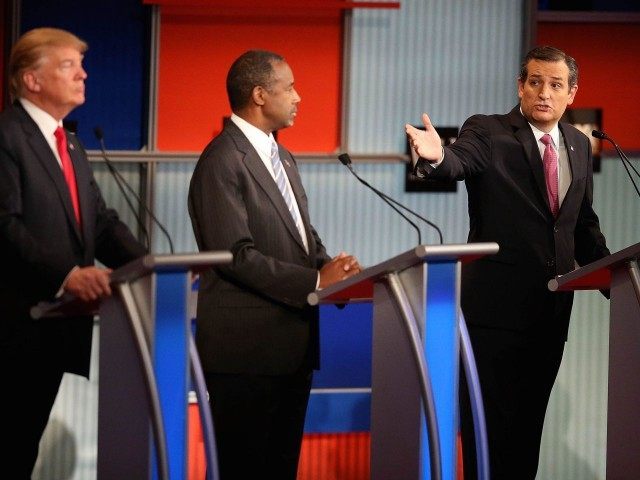Tuesday evening’s GOP debate was billed as a discussion of the economy. And in the first hour, the Fox Business Network moderators kept the focus on wages, jobs, and taxes. But the most fascinating exchange came in the second hour, when questions about foreign policy produced freewheeling exchanges on foreign policy that covered nearly every perspective in the GOP, and which the moderators–to their credit–allowed to unfold relatively freely.
The first exchange came in a back-and-forth between Sen. Marco Rubio (R-FL) and Sen. Rand Paul (R-KY) over military spending. Rubio said: “I know that Rand is a committed isolationist.” Paul shot back that Rubio’s defense policy was unaffordable “How is it conservative to add a trillion dollars in military expenditures? You cannot be a conservative if you’re going to keep promoting new programs you’re not going to pay for.”
Then Ted Cruz weighed in, arguing for a “middle ground” between the two, while Carly Fiorina proposed combining “zero based budgeting with tax reform” to free the revenues needed for America to return confidently to a position of military strength.
Next came a lively discussion about the Trans-Pacific Partnership, in which Donald Trump delivered a well-rehearsed argument in favor of free trade in general but against Obama’s “horrible deal” in particular.
Then the moderators asked Dr. Ben Carson whether he supported President Barack Obama’s policy of sending special operations troops to Syria. He answered that he did–and gave a detailed explanation, one that demonstrated his command of the issue, and defined a clear goal in fighting ISIS: “We have to destroy their caliphate,” he said.
What followed was fascinating. Former Florida Gov. Jeb Bush argued for supporting “remnants of the Syrian Free Army” and creating a no-fly zone. Trump argued that the U.S. needed to work with Russia in opposing ISIS, and push the Europeans to take responsibility for defending Ukraine. Bush said Trump was “absolutely wrong,” because working with Russia meant shoring up the Syrian regime. Trump countered: “Assad is a bad guy, but we have no idea who the so-called rebels” are. Fiorina disagreed: “One of the reasons I said I wouldn’t be talking to Vladimir Putin right now is because we are speaking to him in a position of weakness brought on by this administration.”
Rubio then returned to the fray and argued that America had to be involved because ISIS intends to attack America: “They hate us because of our values, they hate us because our girls go to school, because women drive in the U.S. Either they win or we win. We better take this risk seriously, it is not going away on its own.” Ohio Gov. John Kasich had the last word, talking about the need to resist Chinese cyberattacks and support allies, including Israel.
The moderators–the best of any network thus far–let the candidates fight it out. There was no real “winner”–just as there are no easy answers. But the GOP field proved it is treating foreign policy with the seriousness it deserves.

COMMENTS
Please let us know if you're having issues with commenting.